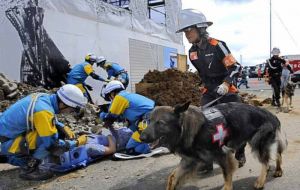MercoPress. South Atlantic News Agency
IAEA says Japan’s nuclear emergency remains very serious; death and missing toll reaches 21.000
 Search and relief efforts continue among the rubble
Search and relief efforts continue among the rubble The United Nations nuclear agency, IAEA, says there have been positive developments in Japan's efforts to tackle a nuclear emergency after the 11 February quake.
The IAEA said smoke or vapour rising from one of the overheating reactors at the damaged Fukushima power plant had become less intense. But it said the overall situation remained very serious.
The official death toll has now risen to 8,450, with 12,931 people missing.
Electricity has been restored to three reactors at the crippled Fukushima nuclear power plant - this should allow the use of on-site water pumps soon.
Engineers have been spraying fuel rods with salt water to try to them the rods cool enough to avert radiation leakage. Villagers living near the plant have been told not to drink tap water due to higher levels of radioactive iodine.
“There have been some positive developments in the last 24 hours but overall the situation remains very serious,” said Graham Andrew, a senior official of the International atomic Energy Agency.
“We consider that now we have come to a situation where we are very close to getting the situation under control,” Deputy Cabinet Secretary Tetsuro Fukuyama said.
However, bad weather forced the Japanese Prime Minister, Naoto Kan, to cancel a planned visit to emergency workers near the Fukushima plat.
Search-and-relief efforts in the prefecture of Miyagi, where the police chief believes the final quake-tsunami death toll could reach 15,000, have been delayed by driving rain.
“We basically cannot operate helicopters in the rain,” Miyagi official Kiyohiro Tokairin said.
“We have been using helicopters to deliver relief goods to some places but for today we have to switch the delivery to places that we can reach by road,” he said. Heavy rain has intensified fears of radiation contamination too.
A Fukushima prefecture official said radiation levels tended to rise when rain fell, warning people to try to stay dry, or to dry off quickly after being in the rain.




Top Comments
Disclaimer & comment rulesCommenting for this story is now closed.
If you have a Facebook account, become a fan and comment on our Facebook Page!